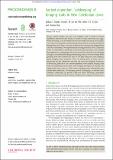Context-dependent 'safekeeping' of foraging tools in New Caledonian crows
Abstract
Several animal species use tools for foraging, such as sticks to extract embedded arthropods and honey, or stones to crack open nuts and eggs. While providing access to nutritious foods, these behaviours may incur significant costs, such as the time and energy spent searching for, manufacturing and transporting tools. These costs can be reduced by re-using tools, keeping them safe when not needed. We experimentally investigated what New Caledonian crows do with their tools between successive prey extractions, and whether they express tool ‘safekeeping’ behaviours more often when the costs (foraging at height), or likelihood (handling of demanding prey), of toolloss are high. Birds generally took care of their tools (84% of 176 prey extractions, nine subjects), either trapping them underfoot (74%) or storing them in holes (26%)—behaviours we also observed in the wild (19 cases, four subjects). Moreover, tool-handling behaviour was context-dependent, with subjects: keeping their tools safe significantly more often when foraging at height; and storing tools significantly more often in holes when extracting more demanding prey (under these conditions, foot-trapping proved challenging). In arboreal environments, safekeeping can prevent costly tool losses, removing a potentially important constraint on the evolution of habitual and complex tool behaviour.
Citation
Klump , B C , van der Wal , J E M , St Clair , J & Rutz , C 2015 , ' Context-dependent 'safekeeping' of foraging tools in New Caledonian crows ' , Proceedings of the Royal Society B: Biological Sciences , vol. 282 , 20150278 . https://doi.org/10.1098/rspb.2015.0278
Publication
Proceedings of the Royal Society B: Biological Sciences
Status
Peer reviewed
ISSN
0962-8452Type
Journal article
Description
This work was supported by the Biotechnology and Biological Sciences Research Council (BBSRC; David Phillips Fellowship BB/G023913/2; C.R.), and studentships from the BBSRC (B.K.) and the University of St Andrews (J.v.d.W.).Collections
Items in the St Andrews Research Repository are protected by copyright, with all rights reserved, unless otherwise indicated.

